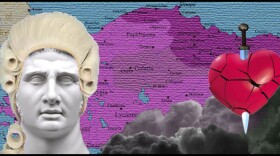
WWFM Sunday Opera with Michael Kownacky
Sundays at 3 pm
Enjoy world-class productions from the world of opera featuring the great singers past and present performing in the world's great opera houses.
Paul Moravec & Mark Campbell's "Light Shall Lift Us"
Here is the link to the video presentation of "Light Shall Lift Us: Opera Singers Unite in Song"
https://www.youtube.com/watch?v=u8A8fIGbYyY.
-
Some composers, like Paul Dukas, are best known for one or two specific works, and on this week’s Sunday Opera (2/22 3:00 p.m.), we’re going to change that when we look at his only surviving opera “Ariane et Barbe-Bleue.” The extremely self-deprecating Dukas destroyed his other three operas, so we’re lucky to have this delightful version of the Charles Perrault fairytale.
-
What were you doing when you were 14?If you were Mozart, you were working on a three act opera titled “Mitridate re di Ponto” which is our featured work on this week’s Sunday Opera (2/15 3:00 p.m.) in a recording from 2014.
-
for this week’s program (2/8 3:00 p.m.), we’re heading back to the 18th century for an opera that takes place around the 12th century BC in Christoph Willibald Gluck’s “Demonfoonte” or “Demofonte” or a variety of other titles. Based on a very popular libretto by Pietro Metastasio, the opera had its premier in Milan in 1743. The story is set in ancient Thrace during a “legendary and mythical” time.
-
We turn to England for this week’s Sunday Opera (2/1 3:00 p.m.) for the only full-length opera by Sir William Walton, his 1954 treatment of a poem by Geoffrey Chaucer about the doomed love of “Troilus and Cressida." This recording from Opera North features a roster of some of the best-loved voices in British opera.
-
As promised, we’ll be looking at two operettas on this week’s Sunday Opera (1/25 3:00 p.m.), Joseph Beer’s “The Polish Wedding” and Leo Fall’s “The Rose of Istanbul.”
-
We’re turning to a 21st century American opera by Joseph Summer on this week’s Sunday Opera (1/18 3:00 p.m.) in his treatment of Shakespeare’s “Hamlet.” The 2006 work stays very close to the original play (unlike the Ambroise Thomas), and the straightforward treatment of the text by Summer, fits neatly into his three-act structure.
-
One of the most “edited” operas is featured on this week’s Sunday Opera (1/11 3:00 p.m.) in a recording featuring a dream cast featured in a 1966 recording performing the five-act version that’s missing only the ballet – or is it? It’s a tale of lost love, jealousy, and the Spanish Inquisition with Giuseppe Verdi’s 1867 opera “Don Carlo.”
-
What happens when a “hometown” commissions an opera about their best known resident? A bit of historical fiction, quite a bit actually, will result, and the output is on this week’s Sunday Opera (1/4 3:00 p.m.) in Alberto Franchetti’s homage to Christopher Columbus to celebrate the 400th Anniversary of Columbus’ voyage and the unification of Italy.
-
Beginning in November, I thought about looking for a new opera to play as we approached the New Year. However, by the beginning of December, I’d already heard from several people who asked me to repeat Johann Strauss' “Die Fledermaus” because it’s become a part of their family tradition. Who am I to go against tradition? So, on this week’s Sunday Opera (12/28 3:00 p.m.), the all-star “bat” returns!
-
We have a Christmas favorite on this week’s Sunday Opera (12/21 3:00 p.m.) as we turn to Englebert Humperdinck’s 1892 Marchenoper or “fairytale opera,” “Hansel and Gretel” in an English Translation by Tom Hammond. It features Heidi Grant Murphy and Suzanne Mentzer in the title roles.











